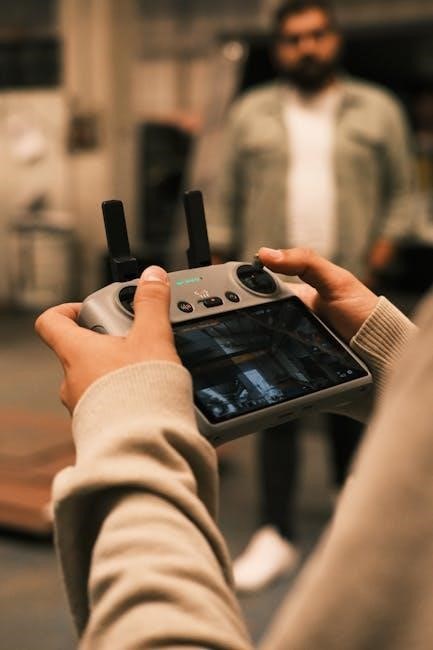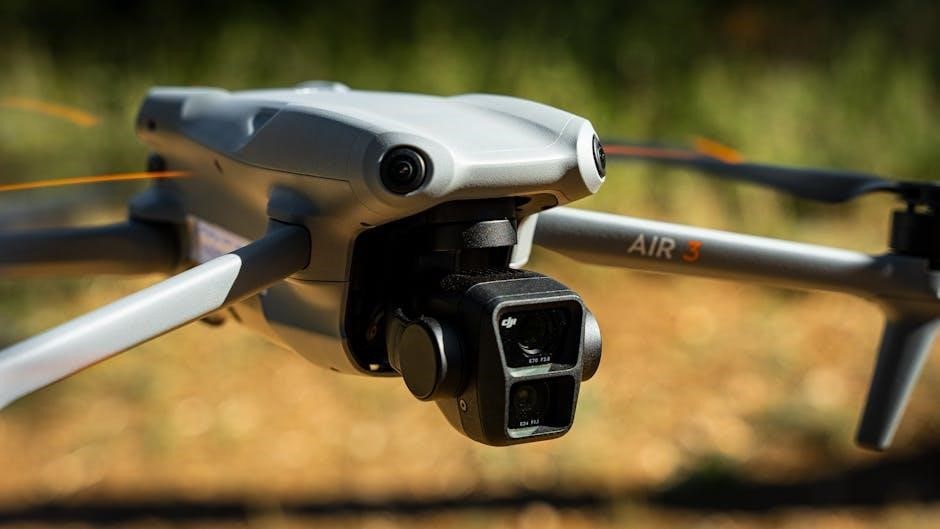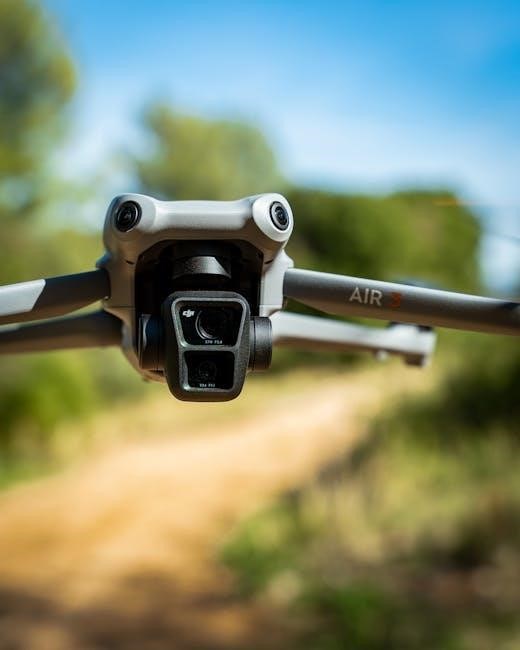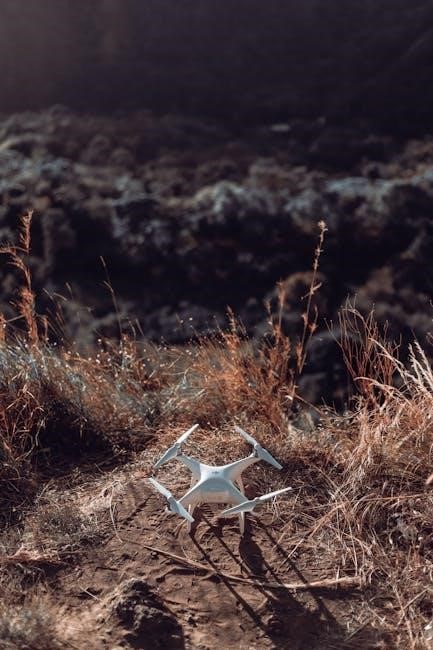dji phantom 3 standard manual
Get the official DJI Phantom 3 Standard manual! Learn expert tips, troubleshooting, and flight optimization. Master your drone with our comprehensive guide.
The DJI Phantom 3 Standard is an easy-to-fly quadcopter designed for aerial photography and filmmaking‚ featuring a high-quality camera and a custom-built remote controller.
1.1 Overview of the Phantom 3 Standard Drone
The DJI Phantom 3 Standard is a quadcopter designed for aerial photography and filmmaking‚ offering ease of use and high-quality results. It includes a built-in camera‚ remote controller‚ and advanced flight features. Ideal for beginners‚ the drone combines simplicity with professional-grade capabilities‚ making it a versatile tool for capturing stunning aerial imagery and video.
1.2 Key Features and Capabilities
The Phantom 3 Standard features a high-quality camera for aerial photography‚ a custom-built remote controller‚ and a weight of 1216 grams including the battery. It supports advanced flight modes and app-based control through the DJI GO app‚ enabling users to capture stunning imagery and video with ease. Its design emphasizes simplicity and professional-grade performance for versatile aerial applications.

What’s in the Box
The Phantom 3 Standard box includes the drone‚ remote controller‚ battery‚ user manual‚ quick start guide‚ and essential accessories for immediate operation and setup.
2.1 Unboxing and Inventory Checklist
When unboxing the DJI Phantom 3 Standard‚ ensure the following items are included: the drone‚ remote controller‚ battery‚ propellers‚ user manual‚ quick start guide‚ and charger. Verify all components are undamaged and accounted for before proceeding. This checklist ensures you have everything needed for initial setup and operation.
- Drone aircraft
- Remote controller
- Battery and charger
- Propellers
- User manual
- Quick start guide
- Power adapter
2.2 Accessories and Optional Equipment
The Phantom 3 Standard supports various accessories to enhance functionality; These include additional propellers‚ extra batteries‚ a remote controller charger‚ and a micro SD card for storage. Optional equipment like a carrying case can protect the drone during transport. Accessories are available through the DJI official website or authorized retailers‚ ensuring compatibility and quality.
- Extra propellers
- Additional batteries
- Remote controller charger
- Micro SD card
- Carrying case
Quick Start Guide
Review the Quick Start Guide for initial setup steps‚ safety tips‚ and pre-flight checks. Ensure all components are unpacked and software is updated before first use.
3.1 Preparing for Your First Flight
Before your first flight‚ review the Quick Start Guide and ensure the remote controller is properly set up. Attach propellers‚ check the battery‚ and calibrate the compass. Ensure the gimbal is secure and the camera is set to the desired mode. Familiarize yourself with safety guidelines and conduct a pre-flight inspection to ensure all components are functioning correctly.
3.2 Step-by-Step Setup Process
- Unfold and adjust the mobile device holder on the remote controller.
- Power on the remote controller and ensure it pairs with the drone.
- Attach the propellers and ensure the gimbal is securely locked.
- Open the DJI GO app‚ follow on-screen instructions for calibration.
- Check firmware versions and update if necessary.
Remote Controller Setup
The remote controller is ergonomically designed for easy operation. Pair it with the drone‚ adjust the mobile device holder‚ and power it on to begin setup.
4;1 Understanding the Remote Controller Layout
The remote controller is essential for operating the Phantom 3 Standard. It features two joysticks for flight control‚ a power switch‚ and buttons for return-to-home‚ pause‚ and camera settings. A mobile device holder is included for mounting your smartphone or tablet to access the DJI GO app. The layout is intuitive‚ with key functions easily accessible for seamless drone operation.
4.2 Customizing Controller Settings
The DJI Phantom 3 Standard allows users to customize the remote controller settings for a personalized flying experience. Adjustments can be made to stick sensitivity‚ custom button assignments‚ and joystick calibration through the DJI GO app. Users can also customize flight modes‚ such as setting up alerts or modifying the return-to-home altitude. These settings enhance control and adapt the drone’s behavior to individual preferences.
Flight Basics
The DJI Phantom 3 Standard is an easy-to-fly quadcopter designed for aerial photography and filmmaking. It features a high-quality camera and a custom-built remote controller for seamless control.
5.1 Pre-Flight Checks and Safety Tips
Before flying‚ ensure the propellers are securely attached and undamaged. Check the battery level and ensure the remote controller is fully charged. Verify the microSD card is installed and formatted. Conduct a quick inspection for any damage or obstructions. Choose a safe‚ open area away from people and obstacles. Avoid flying near airports or in no-fly zones‚ and always follow local regulations. Use the DJI GO app to check for firmware updates and calibrate the compass if necessary. Ensure the gimbal is balanced and the camera is secured. Always maintain visual line of sight with the drone and be aware of weather conditions‚ avoiding strong winds or rain. Familiarize yourself with emergency procedures‚ such as RTH (Return-to-Home) functionality‚ in case of signal loss or low battery. Never fly under the influence of alcohol or drugs‚ and keep the drone away from children and pets. Proper preparation and adherence to safety guidelines will help ensure a safe and enjoyable flight experience.
5.2 Understanding Flight Modes (P‚ S‚ A)
The DJI Phantom 3 Standard offers three primary flight modes: P (Positioning)‚ S (Sport)‚ and A (Attitude). P mode uses GPS stabilization for smooth‚ steady flight and is ideal for beginners. S mode disables obstacle avoidance and GPS stabilization for faster‚ more agile flight. A mode turns off GPS and relies on altitude hold‚ suitable for experienced pilots in tight spaces. Each mode tailors the drone’s behavior for specific flying scenarios‚ enhancing control and versatility.
Camera and Gimbal
The Phantom 3 Standard features a high-quality camera for stunning aerial photography and filmmaking‚ supported by a 3-axis gimbal that ensures smooth and stable footage capture.
6.1 Camera Settings and Configuration
The Phantom 3 Standard’s camera offers customizable settings via the DJI GO app‚ allowing adjustments to resolution‚ frame rates‚ and photo modes. Users can capture 12MP still images or record up to 2.7K video. The gimbal enables smooth stabilization‚ and settings like white balance and exposure can be fine-tuned for optimal results. Calibration options ensure the gimbal operates precisely‚ enhancing image stability during flight.
6.2 Gimbal Calibration and Maintenance
Calibrate the gimbal using the DJI GO app to ensure stability and balance. Regularly clean the gimbal and check for loose connections. Use the app to reset the gimbal if issues arise. Avoid extreme temperatures and physical stress. Update firmware periodically for optimal performance. Always follow the manual’s guidelines for maintenance to preserve camera and gimbal functionality. Proper care ensures smooth operation and high-quality footage capture.

Advanced Features
The DJI Phantom 3 Standard offers advanced features like Waypoints for autonomous flights‚ Follow Me mode‚ and the DJI GO app for enhanced control‚ enabling precise and smooth aerial captures.
7.1 Waypoints and Follow Me Modes
The DJI Phantom 3 Standard supports Waypoints for autonomous flight planning‚ enabling users to set multiple GPS points for precise aerial missions. Follow Me mode allows the drone to track a moving subject‚ capturing dynamic footage effortlessly. These features enhance creativity and productivity‚ making complex shots achievable with minimal manual control.
7.2 Using the DJI GO App for Advanced Control
The DJI GO app offers advanced control features for the Phantom 3 Standard‚ enabling users to adjust settings‚ access flight data‚ and manage media. It supports iOS 8.0 and Android devices‚ with QR code scanning for easy installation. The app allows playback of photos and videos‚ provides access to product documents‚ and supports virtual flight practice‚ enhancing control and creativity for pilots of all skill levels.
Safety and Regulations
Adhere to local regulations‚ understand no-fly zones‚ and follow safety guidelines to ensure responsible and accident-free operation of the DJI Phantom 3 Standard drone.
8.1 Understanding No-Fly Zones
No-fly zones are areas where drone operation is restricted due to safety or regulatory reasons. These zones include airports‚ national parks‚ and sensitive government areas. The DJI Phantom 3 Standard uses GPS to detect and enforce these restrictions. Always check local regulations and use the DJI GO app to verify no-fly zones before flying. Compliance is essential to ensure safe and legal operation.
8.2 Best Practices for Safe Flying
Always conduct pre-flight checks‚ ensuring the drone and remote controller are fully functional. Register your drone if required by local regulations. Fly in open areas‚ maintaining a clear line of sight. Avoid flying near airports‚ people‚ or obstacles. Check weather conditions and battery levels before and during flights. Follow local laws and airspace restrictions to ensure safe and responsible operation.

Maintenance and Troubleshooting
Regularly inspect and clean the drone‚ propellers‚ and gimbal. Address common issues like connection problems or firmware errors promptly. Refer to the manual for solutions.
9.1 Cleaning and Inspecting the Drone
Regular maintenance ensures optimal performance. Clean the drone with a soft cloth‚ avoiding harsh chemicals. Inspect propellers for damage and ensure secure attachment. Check motors for debris and proper function. Verify gimbal alignment and camera lens clarity. Routine inspections help prevent issues and extend the drone’s lifespan. Always follow manual guidelines for cleaning and inspection procedures.
9.2 Common Issues and Solutions
Address issues like firmware glitches by updating to the latest version. Calibrate the gimbal and camera for stability. Resolve remote controller connectivity problems by resetting or updating the DJI GO app. Inspect and clean motors for optimal performance. For battery issues‚ ensure proper charging and storage. Refer to the manual for troubleshooting specific error codes and maintenance tips to resolve common operational problems effectively.
Firmware and Software Updates
Regularly update the drone firmware and DJI GO app to ensure optimal performance‚ security‚ and access to new features. Updates fix issues and enhance functionality.
10.1 Updating the Drone Firmware
To update the drone firmware‚ connect the Phantom 3 Standard to the DJI GO app. Ensure the aircraft and remote controller are fully charged. Download the latest firmware from the app‚ then follow on-screen instructions to complete the update. Avoid interrupting the process to prevent issues. Regular updates enhance performance‚ security‚ and functionality‚ ensuring optimal flight experience and compatibility with the latest features.
10.2 Updating the DJI GO App
Regularly updating the DJI GO app ensures access to the latest features‚ improved performance‚ and compatibility with your Phantom 3 Standard. Download updates through the App Store for iOS or Google Play for Android. Open the app‚ go to the settings menu‚ and check for updates. Install the update and restart the app to apply changes. Always ensure a stable internet connection during the update process.

Storage and Transportation
Store the Phantom 3 Standard in a cool‚ dry place‚ away from direct sunlight. Use the original case for transportation to protect the drone and accessories.
11.1 Proper Storage Conditions
Store the DJI Phantom 3 Standard in a cool‚ dry environment‚ away from direct sunlight and moisture. Avoid extreme temperatures and humidity. Use the original packaging or a protective case to prevent damage. Keep the drone and accessories away from flammable materials and ensure the battery is stored separately at room temperature for optimal longevity.
11.2 Traveling with Your Phantom 3 Standard
When traveling with your Phantom 3 Standard‚ use a protective case or original packaging to safeguard the drone and accessories. Remove the battery and store it separately in a cool‚ dry place. Ensure compliance with local aviation regulations and airport guidelines for carrying lithium batteries. Keep the drone and controller easily accessible for security checks and transport them in a secure‚ padded bag to prevent damage.
Additional Resources
Access official manuals‚ software‚ and video tutorials at the DJI Download Center for comprehensive support and learning materials.
12.1 Official DJI Phantom 3 Standard Manual
The official DJI Phantom 3 Standard manual provides detailed instructions for setup‚ operation‚ and maintenance. Download it from DJI’s website for comprehensive guidance on safety‚ flight preparation‚ camera settings‚ and troubleshooting. Version 1.4 includes specifications‚ pre-flight checks‚ and firmware update procedures‚ ensuring optimal performance and safe flying experiences for all users. Refer to it for precise technical information and best practices.
12.2 Video Tutorials and Guides
Video tutorials and guides for the DJI Phantom 3 Standard are available on DJI’s official website and YouTube. These resources cover setup‚ flight basics‚ camera settings‚ and advanced features. Designed for both beginners and experienced pilots‚ they provide step-by-step instructions to master the drone’s capabilities. Additionally‚ the DJI GO app offers a virtual flight mode for practice‚ ensuring users can improve their skills safely and effectively.
The DJI Phantom 3 Standard is a powerful tool for aerial photography and filmmaking‚ offering a user-friendly experience with advanced features. By following the manual and utilizing video tutorials‚ users can unlock its full potential. Regular updates and maintenance ensure optimal performance‚ making it a reliable choice for both beginners and professionals. This guide provides a comprehensive foundation for mastering the Phantom 3 Standard.

